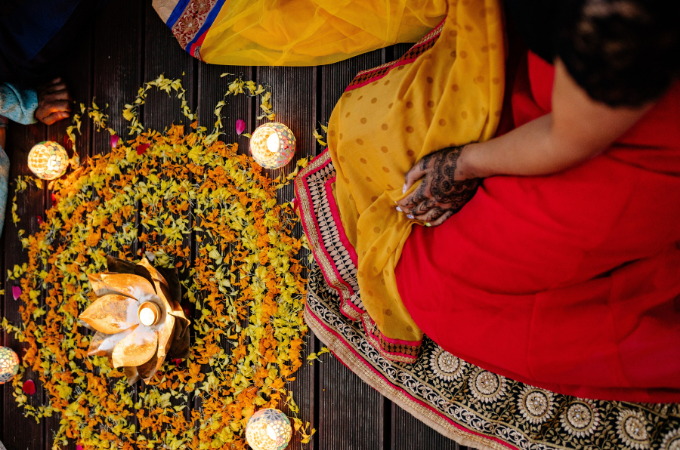
Dhruv and I placed the little clay lamps along the driveway, on the windowsills, on the outside table, and in between the plants in the garden. We would light them all as the sun sets for the night. This was the first Diwali in the new house, and we wanted to create new memories by blending our families’ traditions. I had already mixed the three different types of oil: castor oil, sweet oil, and sunflower oil, for the evening bath. Both our grandmothers and mothers had been strict about the three-oil bath during our childhood. We recalled our grandmothers and the vigorous rubbing of oil into our hair, behind our ears, and then being given the bowl to lather the rest on us in the bathroom. We didn’t know the significance of it, but we couldn’t imagine not doing it.
We spent most of the previous night in the kitchen, covering the counters with treats that defined Diwali in our childhood homes. Dhruv’s mother always made a coconut cake with strawberries on top, and because we were making our own traditions, we topped ours with mango slices instead. We made my father’s favourites, cardamom and pistachio burfee and pecan chana magaj, tastes that always lingered in my mouth long after Diwali was over. We washed and arranged different fruit on a silver platter, ready for the prayer in the evening. We washed the banana leaves and laid them out to dry on the dining room table. We shaped laddoos into round balls, the yellow food colouring staining our palms.
Dhruv was in the kitchen making paneer makhani for dinner, with lemon basmati rice.
“You’ve got a good one,” mom said once. “His bookshelf is bigger than his television. He cooks and is full of respect. Marry him.”
I was in the bathroom, ready to wash away the strong smell of the three-oil mix that clung to my hair. Letting the bath fill, I closed the bathroom window to keep all the steam inside. In the corner of my eye, I saw a little girl in the backyard by the large mulberry trees. I only saw her back and her long black plait. It was probably the neighbour; the children were always coming into our yard to retrieve their toys.
Washing my hair, I remembered my parents telling the story of Diwali to my siblings and me. How Lord Rama, obeying the wishes of his father, went into exile with his wife, Sita, and brother, Lakshmana for fourteen years. How Sita was enticed by the beauty of a golden deer and abducted by the Demon King, Ravana who pretended to be an ascetic. How Lord Ram journeyed to find her and defeated the Demon King. My parents told us that it was called the festival of lights because every home would light their clay lamps to show the power of light over darkness, and it would be a guide for Ram, Sita and Lakshman to come home.
Dhruv walked into the bathroom and sat at the edge of the tub. “Dinner’s ready,” he said with a smile. His eyes were true to his name, the brightest star in the night sky. “Do you need some help?” he asked as he took my hair in his fingers and picked up the shampoo.
“There was a little girl in the backyard.”
“I know, I saw her from the kitchen. She looks like you in that photo above the fireplace,” he said.
“What’s your favourite thing about Diwali?”
“The food. But I also like the family time, I’ve always remembered it as happy. Yours?”
“The story. I love the Ramayana. But my favourite part is–”
“The Shiva Dhanush, I know,” he laughs.
In the Ramayana, before Lord Rama marries Princess Sita, he, and other suitors, are challenged to lift and string the Shiva Dhanush – a powerful and heavy golden bow that belonged to Lord Shiva. Many suitors had tried and failed, for nobody could lift the bow, let alone string it. Until Lord Rama. With thousands of kings and princes watching, he lifted the bow, stretching it to his ear to examine it, then strung it effortlessly. And in doing so, the bow broke, releasing a thunderous roar that echoed in the mountains surrounding Mithila. Sage Valmiki, author of the Ramayana, said that Lord Ram unintentionally broke the bow, but the breaking of it signified that he was the perfect match for Sita. It paralleled the consorts of the main Hindu Gods; Shiva with Parvathi, Vishnu with Lakshmi, and now, Ram with Sita.
Dhruv and I lit the lamps inside, offered the food at our prayer place and now were waiting for darkness to fall so that we could light the clay lamps outside.
We were in the kitchen, mixing rose syrup into cold milk to break our fast as was customary on Diwali, when we heard the first giggle in the backyard. Dhruv opened the back door, trying to find the source.
“I’m sure the children are playing by the mulberry trees,” I said.
“It’s getting dark, they shouldn’t be out there alone,” Dhruv said.
We walked outside, Dhruv taking my hand, as the giggles became louder and more contagious.
We saw the little girl from earlier, peeking out from behind the closest mulberry tree. She hid her face and stuck her hand out, calling us closer. She looked exactly like me at seven years old.
“Aarya! So, I grow up to be happy!” she exclaimed.
Dhruv knelt in front of her, taking her hand, asking her where she came from. She giggled as she turned around and ran toward the fence, carefully climbing between the sturdy wooden planks.
“Stop! It’s getting dark,” I shouted. But she continued running, and we continued after her.
She led us to a clearing behind our row of houses. She sat down on the now damp grass, with her head to the sky, a smile stretching across her face.
“This is our favourite time of the year, isn’t it, Aarya?” she asked me.
“Yes, it is,” I said, sitting down next to her. “Now, where did you come from?”
“From you,” she said. She smiled and blinked at Dhruv. “Little Dhruv is here too.”
“Where is he?”
“Waiting behind those trees. Do you want to meet him?”
“Yes,” we said together.
She led us across the clearing to a thick row of trees. It was almost dark now, the thick trees casting shadows everywhere, but there was a source of light somewhere.
“Dhruv!” little Aarya called out.
“I’m here,” came a muffled reply.
Dhruv and I looked at each other, unsure of what was happening.
Walking through the trees, we came to a smaller clearing. At the centre was a large golden bow resting on a wooden platform, glowing as if it were on fire. It looked exactly as I imagined the Shiva Dhanush to be. Little Dhruv was sitting on the platform, like little Aarya before, he was looking at the sky.
Dhruv walked toward his younger self, who jumped into his arms.
“Is this the girl we dream of?” little Dhruv asked, looking at me.
“Yes,” Dhruv smiled. “Why are you here alone?”
“Aarya and I want you to string the bow, like Lord Ram did.”
“It’s too big, Dhruv, I can’t do it,” Dhruv told him.
“But you have to,” little Aarya said. “If not, we can’t go home.”
Dhruv looked at me and shrugged.
“I’ll try,” he told the children, “but I’m not making any promises.” He took off his watch and gave it to me. “Wish me luck,” he winked.
I took the children’s hands and stepped back. Little Aarya’s excitement crept up my arm until I felt it too. Little Dhruv’s eyes shone in the darkness, the glow emitting from the bow. The hair on his arms were standing straight up and he shivered every few seconds with excitement.
My Dhruv took a deep breath and walked up to the platform, to the middle of the bow. He turned around and smiled at me, before turning to face the bow once more. He stood with his palms together in silent prayer for a moment before trying to pick up the bow.
And he did. Slowly and then all at once. He tilted it slowly until it stood up straight. The children let go of my hands and ran toward the platform, cheering.
Dhruv pulled at the string, its tautness showing as the veins on his arms became more and more prominent.
When Dhruv strung the bow, it broke, just like in the Ramayana. A roar echoed through the trees and the light of a thousand stars filled the clearing followed by a fierce gust of wind that whipped my hair.
When it died down, I was in Dhruv’s arms again.
Little Aarya tugged on my hand, looking me straight in the eye. “Be happy okay.”
Then she and little Dhruv hugged us before disappearing into the trees.
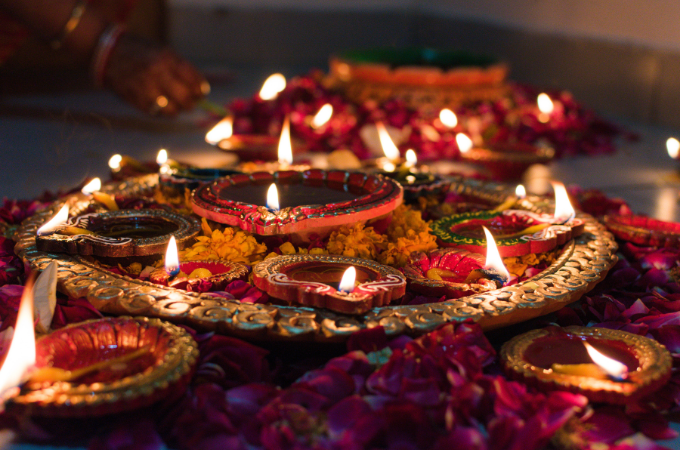
When we returned to our backyard, darkness had fallen, and all the clay lamps that we had laid out were lit. The garden was covered in the soft hue of a hundred little flames dancing in the light breeze.
Photos by Yan Krukov from Pexels and Udayaditya Barua on Unsplash



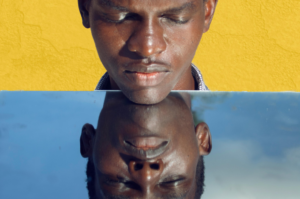

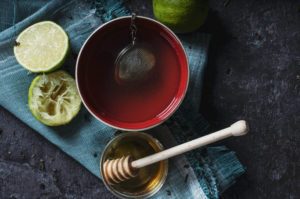

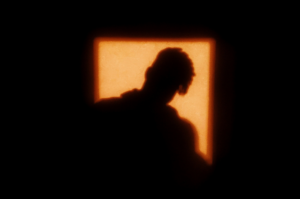
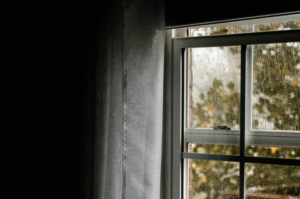

COMMENTS -
Reader Interactions